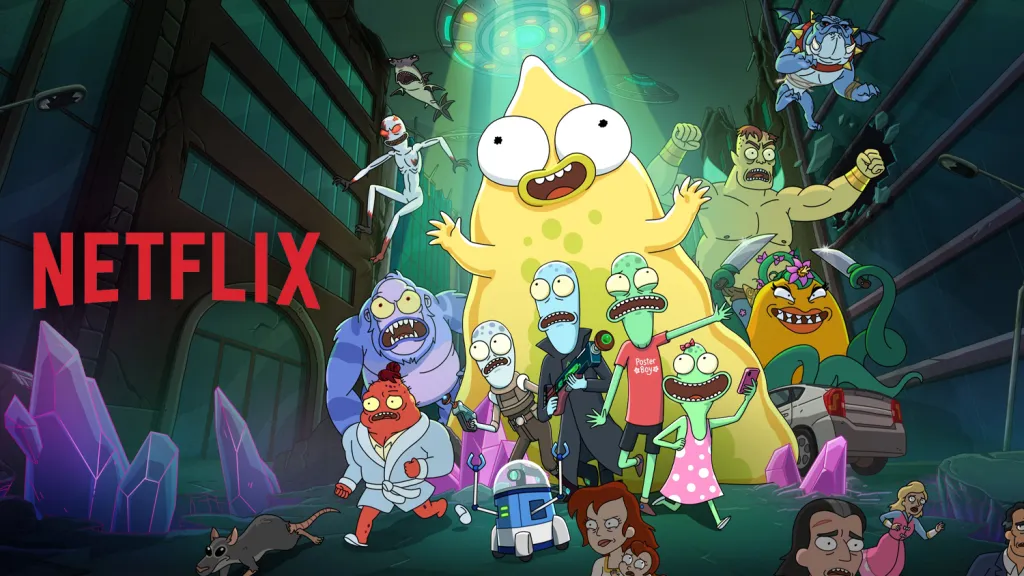
This is something we have rarely seen in the streaming wars era: a current original series from one major streamer getting a release on another major streamer. That’s what happened yesterday, Sept. 28, when all five seasons of Hulu‘s sci-fi animated comedy Solar Opposites quietly became available on Netflix in the U.S., with an international rollout slated for later this year. (The series also remains on Hulu domestically and Disney+/Star internationally.)
It is the first Hulu original series — current or not — to be licensed to another streamer. The Disney platform has done it with three original movies to date: Prey on Roku and Tubi; Flamin’ Hot on Amazon, Roku and Tubi; and Vacation Friends on Amazon, Roku and Tubi.
This is believed to be a one-off agreement tailored to this specific title and not part of a strategy shift. I hear Netflix wanted the 20th Animation-produced Solar Opposites as part of its own push into adult animation, and Disney agreed to license it after thoughtful consideration as an additive to the show being available for Hulu and Disney bundle subscribers.
A very well reviewed series (average 98% on Rotten Tomatoes), Solar Opposites, from creators Justin Roiland, who left after Season 3, and Mike McMahan, has been largely underrated. Five seasons in, the alien comedy has remained a cult hit with devoted but modest in size following.
Despite that, due largely to the strong creative, Hulu and sibling 20th Animation have stuck with the series with a string of renewals, most recently for the upcoming sixth and final season.
The licensing agreement with Netflix is seen as a way for Disney to monetize Solar Opposites better while also raising awareness for the series ahead of the premiere of its sixth and final season on Hulu Oct. 13. (Season 6 also is expected to become available on Netflix next year.)
Like it or not, Netflix provides an ability to expose a title to additional audience with the largest reach available, which explains the newfound success of shows like Suits, Younger and Prison Break on the platform.
Sony Pictures TV and Fox Entertainment just licensed another current series to Netflix, Doc. Its first season had set ratings records for Fox and had been on Hulu for the past year. Yet, the moment it was made available on Netflix in the U.S. last week, it shot up the Top 10 rankings and is currently at #2.
That is a unique case since Fox is a broadcast network and neither Sony TV nor Fox have a vertically integrated general entertainment SVOD platform. Companies like Disney, which do own a streamer, try to retain the majority of their branded content on their own platforms and channels.
Still, after a push for exclusivity in the early years of the streaming wars, traditional media congloms have gradually reverted to a model balancing exclusivity and sharing content through licensing for an additional revenue stream amid a renewed focus to profitability.
“It’s the more natural state of the business,” Netflix co-CEO Ted Sarandos said last year. “They’ve always built the studios to license. The unnatural state was, I think, the kind of forced vertical integration. So I think that there will be opportunities for us to license, and I think more than just opportunities.”
Disney, which had pulled its library content from Netflix following the launch of its own streamer Disney+, signaled a partial return to third-party licensing in late 2024 when it signed a deal with Netflix to secure non-exclusive rights to Grey’s Anatomy for Hulu and the Hulu and Disney+ bundle. In exchange, Disney licensed 14 popular library TV series to Netflix on a non-exclusive basis for 18 months. All of them, including Lost, This Is Us, Prison Break, the adult animated Archer, How I Met Your Mother and The Resident, had already ended their runs on various linear networks; none was an ongoing series like Solar Opposites.
Similarly, Warner Bros. Discovery made a licensing deal with Netflix for HBO series that only covered former series, such as Sex and the City, Six Feet Under and Insecure.
While opening a second window on a rival platform for a streaming series that is still in originals is pretty unprecedented, Solar Opposites is not an ongoing series in the full sense of the word as it has an end date after the upcoming sixth season.
For now, there are no plans to extend the show with a new season for Netflix should the licensed run of the existing seasons do well but that is a theoretical possibility. McMahon has been quoted as saying that he and his team have many more stories to tell about the titular family of aliens — Korvo, Terry, Jesse, and Yumyulack — who crash landed on Earth.
HBO Max and Peacock have allowed series that were not moving forward there to go to Netflix, which was the case with Dead Boy Detectives and Girls5eva, respectively. Meanwhile, Disney, which produces hit Netflix comedy Nobody Wants This, has been reluctant to authorize such transfers; sources had told Deadline that Netflix had expressed interest in picking up additional seasons of Hulu’s Black Cake and FXX/Hulu’s Dave but the conversations were a non-starter. (Netflix’s own deal terms makes a move of its canceled originals impossible.)
The trailer for Season 6 of Solar Opposites, released today, pokes fun of the show’s imminent end.
“After some setbacks, it’s possible to end our mission in about 20 years,” Korvo says.
“Oh, the Hulu Science Monitor just announced that this is our final season,” Terry replies, eliciting a “Bullocks” from Korvo.
For some irony, given the licensing deal with Netflix, Korvo and Terry announce that the Solar Opposites are broke, with all of their moneymaking machines zapped.
“We need to make money and fast….”
Watch the trailer below:



